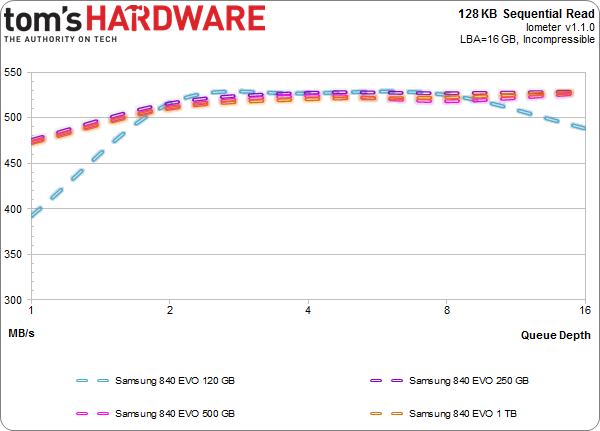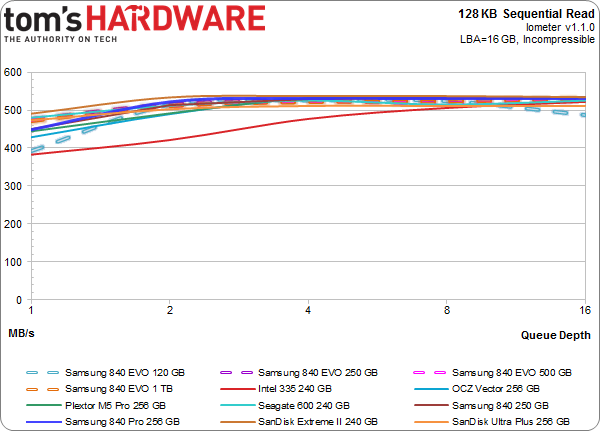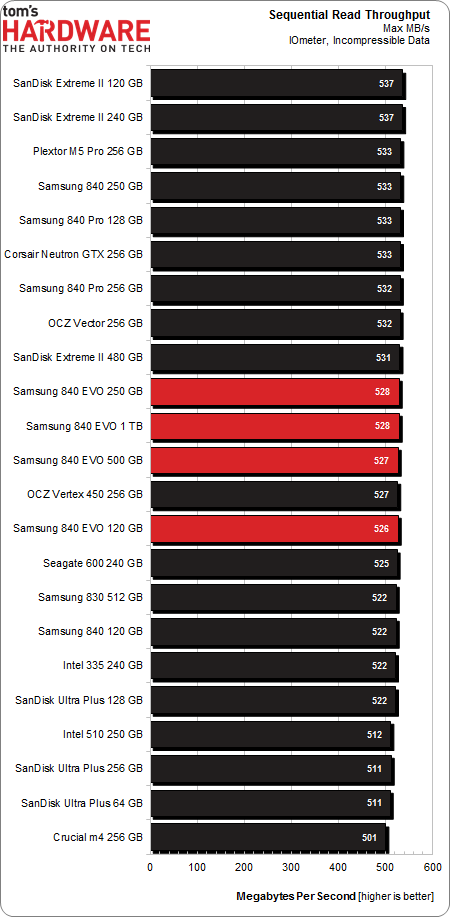Samsung 840 EVO SSD: Tested At 120, 250, 500, And 1000 GB
Last week, Samsung unveiled a successor to its wildly popular 840 at the company's Global SSD Summit in Seoul, South Korea. Stacked with a series of new features and 19 nm, three-bit-per-cell NAND, we benchmark four models and make a recommendation.
Results: 128 KB Sequential Reads
Fantastic sequential read and write performance is a trademark of modern SSDs. To measure it, we use incompressible data over a 16 GB LBA space, then test at queue depths from one to 16. We're reporting these numbers in binary (where 1 KB equals 1024) instead of decimal numbers (where 1 KB is 1000 bytes). When necessary, we're also limiting the scale of the chart to enhance readability.
128 KB Sequential Read
The y-axis starts at 300 MB/s because we need all of the separation we can get to distinguish the larger three 840 EVO drives. Samsung's 120 GB model has a funkier trajectory, starting under 400 MB/s, peaking at a queue depth of two, above the higher-capacity models, and then stumbling again at a queue depth of 16. Such is life for a drive with just eight dice to call its own.
Folding in the rest of the field, only Intel's SSD 335 working with incompressible data at low queue depths stands out.
With a single outstanding command, 100 MB/s separates the fastest and slowest SSDs. Samsung's 840 EVOs are in the thick of it.
Are you wondering which of the drives we tested fares best in our 128 KB sequential read test? Here's a break-down of the maximum observed read performance during Iometer-based benchmarking.
All four 840 EVO drives set up shop in the middle of the pack, though almost every sample lands roughly in the same ballpark. They all push past 500 MB/s at least.
Get Tom's Hardware's best news and in-depth reviews, straight to your inbox.
Current page: Results: 128 KB Sequential Reads
Prev Page Test Setup And Benchmarks Next Page Results: 128 KB Sequential Writes-
Someone Somewhere Surely it would make sense to compare it to the vanilla SSD840. Also, there's no 840 Pro in the power charts.Reply
While the 1TB drive coming down to ~65c/GB is nice, seeing the 120 GB drives get near there would be nice. Especially since this is meant to be the value king. -
drwho1 I have 2 840 pro 512 GB SSD's (1 on my notebook 1 on my PC)Reply
I got them on a sale on Newegg for around $500 for both of them. :)
A 1TB would be cool if I find it on sale....
or maybe I should try out writing a letter to someone fat in some weird red costume...
-
slomo4sho The performance gap between the 840 Evo and 840 Pro is discouraging for the lower capacity models. I understand that the Pro is the flagship product but I was expecting less of a gap in in the 120GB models since this is a newer generation product and the 840 Pro is still based on the 21nm MLC NAND. However, the 1TB model is is a great choice for mass SSD storage. Lets hope the prices drop below $0.50 per GB soon.Reply -
Someone Somewhere MLC is faster than TLC, and bigger node NAND is usually faster. Only reason to go smaller is price and power.Reply -
SteelCity1981 I wonder if samsung plans on releasing a pro evo series since the regular series evo is to replace the older non pro versions.Reply -
razor512 ripoff, high prices for triple level flash especially at 19mm, the lifespan will likely suck and their shortened warranty represents that.Reply -
master9716 Cost for performance = Very High . ofcourse its not going to perform like a Pro but for the cost im amazed its that much better than the Regular 840.Reply -
J_E_D_70 Glad this review also refutes the perception of low TLC write endurance in normal desktop workloads. Been using a 128GB 840 in a daily-use desktop for eight months now and the endurance counter hasn't decremented at all. I'll have replaced the entire rig long before it wears out.Reply -
JohnnyLucky Interesting review. I think the point to remember is that the 840 EVO is not a high end enthusiast ssd like the 840 Pro. Instead, consider the 840 EVO as a mainstream ssd suitable for most consumer and home office scenarios.Reply


